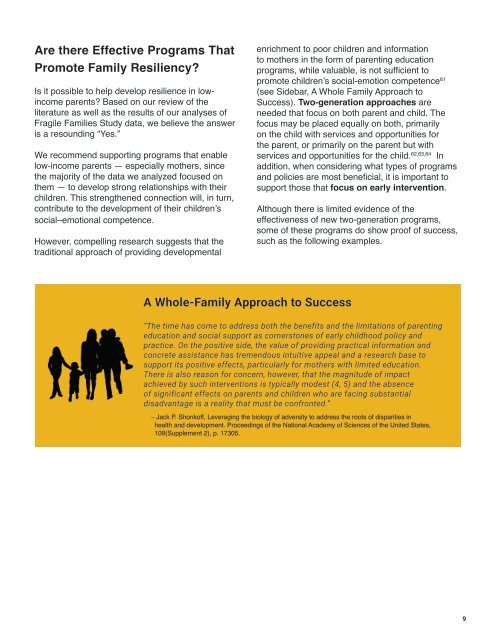NCCP_Resiliency_Brief_R6
Create successful ePaper yourself
Turn your PDF publications into a flip-book with our unique Google optimized e-Paper software.
Are there Effective Programs That<br />
Promote Family <strong>Resiliency</strong>?<br />
Is it possible to help develop resilience in lowincome<br />
parents? Based on our review of the<br />
literature as well as the results of our analyses of<br />
Fragile Families Study data, we believe the answer<br />
is a resounding “Yes.”<br />
We recommend supporting programs that enable<br />
low-income parents — especially mothers, since<br />
the majority of the data we analyzed focused on<br />
them — to develop strong relationships with their<br />
children. This strengthened connection will, in turn,<br />
contribute to the development of their children’s<br />
social–emotional competence.<br />
However, compelling research suggests that the<br />
traditional approach of providing developmental<br />
enrichment to poor children and information<br />
to mothers in the form of parenting education<br />
programs, while valuable, is not sufficient to<br />
promote children’s social-emotion competence 61<br />
(see Sidebar, A Whole Family Approach to<br />
Success). Two-generation approaches are<br />
needed that focus on both parent and child. The<br />
focus may be placed equally on both, primarily<br />
on the child with services and opportunities for<br />
the parent, or primarily on the parent but with<br />
services and opportunities for the child. 62,63,64 In<br />
addition, when considering what types of programs<br />
and policies are most beneficial, it is important to<br />
support those that focus on early intervention.<br />
Although there is limited evidence of the<br />
effectiveness of new two-generation programs,<br />
some of these programs do show proof of success,<br />
such as the following examples.<br />
A Whole-Family Approach to Success<br />
“The time has come to address both the benefits and the limitations of parenting<br />
education and social support as cornerstones of early childhood policy and<br />
practice. On the positive side, the value of providing practical information and<br />
concrete assistance has tremendous intuitive appeal and a research base to<br />
support its positive effects, particularly for mothers with limited education.<br />
There is also reason for concern, however, that the magnitude of impact<br />
achieved by such interventions is typically modest (4, 5) and the absence<br />
of significant effects on parents and children who are facing substantial<br />
disadvantage is a reality that must be confronted.”<br />
– Jack P. Shonkoff, Leveraging the biology of adversity to address the roots of disparities in<br />
health and development. Proceedings of the National Academy of Sciences of the United States,<br />
109(Supplement 2), p. 17305.<br />
9



